Susanwanjiku
On this page, you find all documents, package deals, and flashcards offered by seller susanwanjiku.
- 70
- 0
- 0
Community
- Followers
- Following
70 items

zoology
Zoology is studied as a ‘pure science’ (knowledge gaining) and it has application in other branches such as euphenics, eugenics, biotechnology, bioenergetics, bioinformatics, etc. As applied science, it has tremendous scope in agriculture, aquaculture, animal husbandry, human health, diseases, veterinary science, apiculture, sericulture, pharmacology, animal breeding, etc.
- Summary
- • 55 pages •
Zoology is studied as a ‘pure science’ (knowledge gaining) and it has application in other branches such as euphenics, eugenics, biotechnology, bioenergetics, bioinformatics, etc. As applied science, it has tremendous scope in agriculture, aquaculture, animal husbandry, human health, diseases, veterinary science, apiculture, sericulture, pharmacology, animal breeding, etc.

zoology
Zoology is studied as a ‘pure science’ (knowledge gaining) and it has application in other branches such as euphenics, eugenics, biotechnology, bioenergetics, bioinformatics, etc. As applied science, it has tremendous scope in agriculture, aquaculture, animal husbandry, human health, diseases, veterinary science, apiculture, sericulture, pharmacology, animal breeding, etc.
- Summary
- • 56 pages •
Zoology is studied as a ‘pure science’ (knowledge gaining) and it has application in other branches such as euphenics, eugenics, biotechnology, bioenergetics, bioinformatics, etc. As applied science, it has tremendous scope in agriculture, aquaculture, animal husbandry, human health, diseases, veterinary science, apiculture, sericulture, pharmacology, animal breeding, etc.
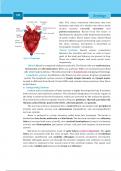
zoology
Zoology is studied as a ‘pure science’ (knowledge gaining) and it has application in other branches such as euphenics, eugenics, biotechnology, bioenergetics, bioinformatics, etc. As applied science, it has tremendous scope in agriculture, aquaculture, animal husbandry, human health, diseases, veterinary science, apiculture, sericulture, pharmacology, animal breeding, etc.
- Summary
- • 56 pages •
Zoology is studied as a ‘pure science’ (knowledge gaining) and it has application in other branches such as euphenics, eugenics, biotechnology, bioenergetics, bioinformatics, etc. As applied science, it has tremendous scope in agriculture, aquaculture, animal husbandry, human health, diseases, veterinary science, apiculture, sericulture, pharmacology, animal breeding, etc.

Zoology
Zoology is studied as a ‘pure science’ (knowledge gaining) and it has application in other branches such as euphenics, eugenics, biotechnology, bioenergetics, bioinformatics, etc. As applied science, it has tremendous scope in agriculture, aquaculture, animal husbandry, human health, diseases, veterinary science, apiculture, sericulture, pharmacology, animal breeding, etc.
- Summary
- • 56 pages •
Zoology is studied as a ‘pure science’ (knowledge gaining) and it has application in other branches such as euphenics, eugenics, biotechnology, bioenergetics, bioinformatics, etc. As applied science, it has tremendous scope in agriculture, aquaculture, animal husbandry, human health, diseases, veterinary science, apiculture, sericulture, pharmacology, animal breeding, etc.

Zoology
Zoology is studied as a ‘pure science’ (knowledge gaining) and it has application in other branches such as euphenics, eugenics, biotechnology, bioenergetics, bioinformatics, etc. As applied science, it has tremendous scope in agriculture, aquaculture, animal husbandry, human health, diseases, veterinary science, apiculture, sericulture, pharmacology, animal breeding, etc.
- Summary
- • 50 pages •
Zoology is studied as a ‘pure science’ (knowledge gaining) and it has application in other branches such as euphenics, eugenics, biotechnology, bioenergetics, bioinformatics, etc. As applied science, it has tremendous scope in agriculture, aquaculture, animal husbandry, human health, diseases, veterinary science, apiculture, sericulture, pharmacology, animal breeding, etc.

AIR CNDITIONING REQUIREMENTS
The requirements for heating, ventilating, and air-conditioning (HVAC) systems. The requirements are a source of information for mechanical system designers and installers, as well as energy consultants
- Summary
- • 51 pages •
The requirements for heating, ventilating, and air-conditioning (HVAC) systems. The requirements are a source of information for mechanical system designers and installers, as well as energy consultants
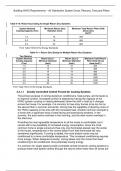
VENTILATION REQUIREMENTS
The requirements for heating, ventilating, and air-conditioning (HVAC) systems. The requirements are a source of information for mechanical system designers and installers, as well as energy consultants
- Summary
- • 52 pages •
The requirements for heating, ventilating, and air-conditioning (HVAC) systems. The requirements are a source of information for mechanical system designers and installers, as well as energy consultants
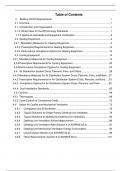
HVAC REQUIREMENTS
The requirements for heating, ventilating, and air-conditioning (HVAC) systems. The requirements are a source of information for mechanical system designers and installers, as well as energy consultants
- Summary
- • 50 pages •
The requirements for heating, ventilating, and air-conditioning (HVAC) systems. The requirements are a source of information for mechanical system designers and installers, as well as energy consultants
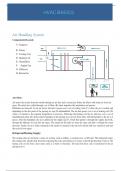
HVAC basics
The basic goals of any HVAC system are to control the ambient temperature, keep humidity levels in check, and ensure optimal air quality inside the building
- Class notes
- • 19 pages •
The basic goals of any HVAC system are to control the ambient temperature, keep humidity levels in check, and ensure optimal air quality inside the building
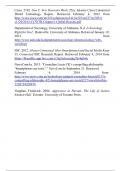
Introduction to sociology
Sociology is the systematic study of society and social interaction. In order to carry out their studies, sociologists identify cultural patterns and social forces and determine how they affect individuals and groups. They also develop ways to apply their findings to the real world.
- Summary
- • 1 pages •
Sociology is the systematic study of society and social interaction. In order to carry out their studies, sociologists identify cultural patterns and social forces and determine how they affect individuals and groups. They also develop ways to apply their findings to the real world.
